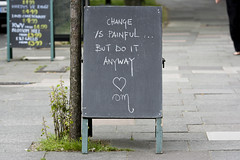This dualistic spirituality described in the previous blogs has been called a number of things, but perhaps the idea of the Sunday-Monday disconnect brings the experience to the fore. We experience a certain type of God on Sunday, but Monday is another matter—“this is ‘the real world’ and things work differently here.” How many times have we ‘professional’ ministers heard variations of that phrase? “You don’t really understand. It’s just not as easy for me as it is for you. You work in the church with Christians”, etc. The two ‘spheres of life,’ the sacred and the secular, are conceived as being infinitely different and heading in opposite directions. It is left to the believer to live one way in the sacred sphere and have to another in the secular. It is the actual way we do church that communicates this non-verbal message of dualism. The medium is the message after all. And it sets people up to see things in an essentially distorted way where God is limited to the religious sphere. This creates a vacuum that is filled by idols and false, or incomplete, worship.

Now, using the same elements and realigning them to fit a non-dualistic understanding of God, Church, and World, of we can re-configure this as follows…

Seeing things this way leads us to embrace an all-of-life perspective to our faith. By refusing the false dualism of sacred or secular and by committing all of our lives under Jesus we live out true holiness. There is nothing in our lives that should not, and cannot, be brought under this rule of God over all. Our task is to integrate the disparate elements that make up our lives and communities and bring them under the One God manifested to us in Jesus Christ.
If we fail to do this, then whilst we might be confessing monotheists, we might end up practicing polytheists. Dualistic expressions of faith always result in practical polytheism. There will be different gods that rule the different spheres of our lives and the God of the Church in this view, is largely impotent outside of the privatized religious sphere. Christocentric Monotheism demands loyalty precisely where the other gods claim it, and this is true for us as it was for our spiritual forebears. For make no mistake, we are surrounded by the claims of false gods in our own way as the many gods clamor for our loyalties and lives as well—not the least of these the worship of wealth and the associated gods of consumerism. But this is also how apartheid was birthed and developed in South Africa. The white Christians of South Africa would not integrate their national situation under the Lordship of Jesus and so a false god was invoked to ruled over white politics…the result was a deeply sinful and ungodly crushing of the people of color in that land. When we fail to bring a sphere under the claim of Jesus, then it becomes autonomous and susceptible to the rule of other gods and many sins result.
In this way, so many Christians end up being practicing polytheists. Isn’t it interesting that most churchgoers report a radical disconnect between the God that rules Sunday and the gods that rule Monday. How many of us live as if there were different gods for every sphere of life? A god for work, another for family, a different one when we are at the movies, or in our politics. No wonder why the average churchgoer can’t seem to make sense of it all. All this results from a failure to respond truly to the One God. This failure can only be addressed by a discipleship that responds by offering all the disparate elements of our lives back to God, thus unifying our lives under his lordship.

